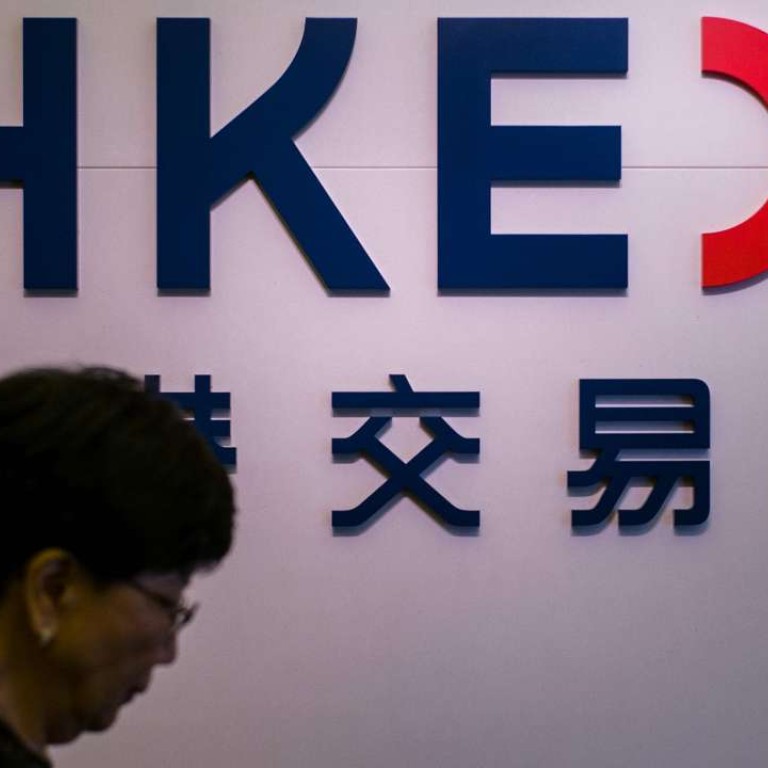
Update | Hong Kong stocks fall in line with rest of Asia amid trade policy concerns, but gold miners surge
Chan Ka Keung, Hong Kong’s Secretary for Financial Services and the Treasury, expects the Year of the Rooster to be full of uncertainties
Hong Kong stocks ushered in the Year of the Rooster with declines, mirroring losses in global equities following US President Donald Trump’s controversial immigration ban.
The city’s financial market will be volatile in the year ahead as investors focus on short-term gains amid looming interest rate hikes and global political risks, analysts say.
The Hang Seng Index was down 0.18 per cent or 42.39 points to 23,318.39 at the close on Wednesday. The Hang Seng China Enterprises Index, or the H-share index, dropped 0.48 per cent or 47.44 points to 9,756.61.
Chan Ka-keung, Hong Kong’s Secretary for Financial Services and the Treasury, said the Year of the Rooster would be full of uncertainties.
“Trump’s policies have brought many changes that will have an impact on the market. The US is likely to have more interest rate rises which Hong Kong will need to follow due to the currency peg,” Chan said at a media briefing on Wednesday.
European countries such as Germany and France have presidential elections. These events will bring shocks to the market
“European countries such as Germany and France have presidential elections. These events will bring shocks to the market,” he added.
On Wednesday, Hong Kong blue chips declined most, with Want Want China the biggest loser, closing 3.06 per cent down to HK$5.39. Casino stocks also retreated after Macau posted a 3.1 per cent rise in January gross gaming revenue, falling short of estimates.
Galaxy Entertainment closed down 2.69 per cent to HK$36.15, and Sands China dropped 2.17 per cent to HK$33.75.
Linus Yip, chief strategist at First Shanghai Securities, said investors were cautiously waiting for clues from the US Federal Reserve meeting on Wednesday and the mainland market reopening on Friday.
“The Hang Seng Index went up to a three-month high last week, and we are seeing some pullback right now,” Yip said. “The growth momentum is not too strong.”

Bucking the downward trend, gold miners rallied, boosted by strong gains in gold future prices on the back of a weak dollar.
Zhaojin Mining jumped 2.34 per cent to HK$7.01 while Zijin Mining climbed 2.29 per cent to HK$2.68.
A major US dollar index hit its worst January performance since 1987 after Trump on Tuesday accused China and Japan of devaluing their currencies to gain a trade advantage against the US.
His top trade advisor Peter Navarro also criticised Germany of using a “grossly undervalued” euro in an interview with the Financial Times.
“As US President Trump continued to sign executive orders to implement his controversial immigration policy, investors were getting more nervous on policy uncertainties and chose to unwind the long US dollar position,” said Ken Cheung, a foreign exchange strategist for Mizuho Bank.
“The US dollar’s path this year is set to stay bumpy,” he added.
As US President Trump continued to sign executive orders to implement his controversial immigration policy, investors were getting more nervous on policy uncertainties. The US dollar’s path this year is set to stay bumpy
Other Asian markets stabilised after losses earlier this week. A weakened yen helped push the Nikkei index up 0.56 per cent to 19,148.08 while South Korea’s Kospi gained 0.62 per cent to 2,080.48.
US stocks ended mostly lower on Tuesday following the biggest losses in 2017 in the previous session. The Dow Jones Industrial Average fell 0.5 per cent to end at 19,864.09. The S&P 500 dropped 0.1 per cent to 2,278,87. But the Nasdaq Composite nudged higher by less than 0.1 per cent to close at 5,614.
On Monday, the Dow sank by the most in three months, as investors fretted over Trump’s executive order banning immigrants from seven Muslim-majority countries. The CBOE Volatility Index, a measure of market anxiety, surged 12.3 per cent, the biggest jump since November 3.
The Hang Seng Index closed Friday at 23,360.78, up a combined 21 per cent for the Year of the Monkey. It marked the best yearly performance for the benchmark index since the Year of the Ox in 2009.
Yip said the rising interest rates globally posed a major challenge for the Lunar New Year, and a series of unpredictable events are making investors unwilling to hold stocks for long term.
“They will use some kind of hit-and-run tactics,” he said. “It makes the market fluctuate. That will be one of the characteristics of the coming year.”



